 Petzlover
Petzlover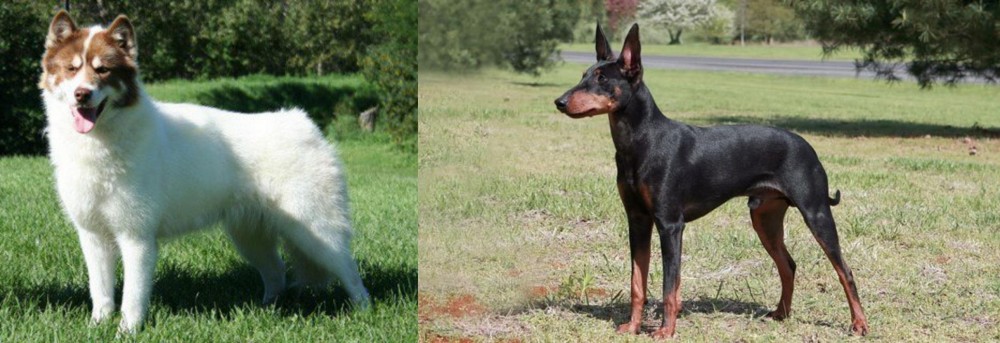 Canadian Eskimo Dog is originated from Canada but Manchester Terrier is originated from United Kingdom. Canadian Eskimo Dog may grow 43 cm / 17 inches higher than Manchester Terrier. Canadian Eskimo Dog may weigh 36 kg / 80 pounds more than Manchester Terrier. Both Canadian Eskimo Dog and Manchester Terrier has same life span. Canadian Eskimo Dog may have more litter size than Manchester Terrier. Canadian Eskimo Dog requires Moderate Maintenance. But Manchester Terrier requires Low Maintenance
Canadian Eskimo Dog is originated from Canada but Manchester Terrier is originated from United Kingdom. Canadian Eskimo Dog may grow 43 cm / 17 inches higher than Manchester Terrier. Canadian Eskimo Dog may weigh 36 kg / 80 pounds more than Manchester Terrier. Both Canadian Eskimo Dog and Manchester Terrier has same life span. Canadian Eskimo Dog may have more litter size than Manchester Terrier. Canadian Eskimo Dog requires Moderate Maintenance. But Manchester Terrier requires Low Maintenance
 The Canadian Eskimo Dog dates way back to more than 4,000 years ago. This Arctic breed of dog was developed to pull sleds, and wasn’t considered as a pet but as a working dog – an important means to an end – a tool for use.
The Canadian Eskimo Dog dates way back to more than 4,000 years ago. This Arctic breed of dog was developed to pull sleds, and wasn’t considered as a pet but as a working dog – an important means to an end – a tool for use.
By the 1960s the dog breed had declined to such an extent that they were removed from UKC and AKC registries. It is believed that the breed would have in all likelihood become extinct if it weren’t for the efforts of Brian Ladoon, William Carpenter and John McGrath who formed the Eskimo Dog Research Foundation in 1972.
After breeding for 30 years, the dog has the biggest genetic stock colony of Canadian Eskimo Dogs and in May 2000, Nunavut, a Canadian territory, adopted the dog as the animal symbol for this region.
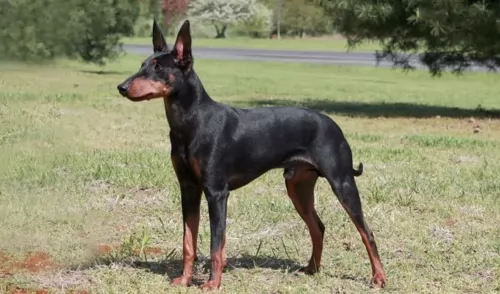 Looking much like the Black and Tan Terrier, the Manchester Terrier is a dog that was actually developed from the Black and Tan, which is the oldest known breed of terrier.
Looking much like the Black and Tan Terrier, the Manchester Terrier is a dog that was actually developed from the Black and Tan, which is the oldest known breed of terrier.
In the United States there are 2 varieties of the Manchester Terrier — the Toy and the Standard but in the UK the 2 sizes are classified as different breeds - the English Toy Terrier and the Manchester Terrier.
The dog was first bred in the 19th century to wipe out rats and mice, originating from Manchester, England. This is an old dog breed, gaining the nickname of the Gentleman's Terrier because of its dignified looks and personality.
After the 2nd World War, the numbers of the dog dropped and this spurred the kennel club to list it as a vulnerable native breed, in danger of extinction. It was in 1937 that the British Manchester Terrier Club was formed.
 The Canadian Eskimo Dog is a well-built, medium- to large sized dog looking much like a husky. The male Eskimo dog is somewhat bigger than the female, standing 58 – 70cm at the shoulder and weighing 30 - 40kg.
The Canadian Eskimo Dog is a well-built, medium- to large sized dog looking much like a husky. The male Eskimo dog is somewhat bigger than the female, standing 58 – 70cm at the shoulder and weighing 30 - 40kg.
The male often has some thick fur around the neck, giving him the appearance of looking larger than he actually is. He is slightly larger than the female. Other people say he has a similar appearance to a wolf.
He has a thick double coat which can be white, gray, fawn or even black and white. He has short, erect ears, dark brown eyes and a bushy, feathered tail which curls over the back. Sometimes you find blue eyes with the Canadian Eskimo Dog, and its only when you want to show him, that this isn’t acceptable.
The Canadian Eskimo Dog's temperament is hard working, tough, brave, alert and intelligent. When he is trained and socialized, which will be important for this breed, he becomes gentle and loving, forming a strong bond with his owner. He’ll also get along well with children in the home as well as other pets.
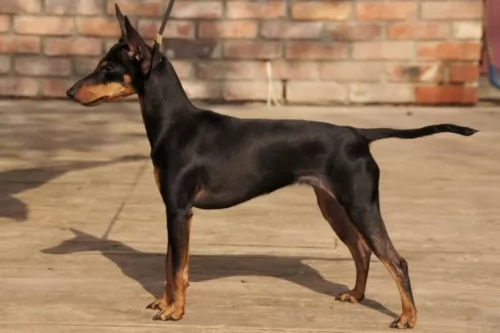 The Manchester Terrier is a small, smooth haired dog with a black and tan coat and a head with a fairly long muzzle, small bright eyes, largish erect ears and a deep chest.
The Manchester Terrier is a small, smooth haired dog with a black and tan coat and a head with a fairly long muzzle, small bright eyes, largish erect ears and a deep chest.
The body is lean and muscular and the tail, where once docked, now tends to be left long. In the toy sized dog you will find him standing at roughly 25 – 30cm in height and he will weigh between 2 to 4kg. The standard sized dog will be slightly taller and heavier and weigh in the region of 8kg.
You can expect between 2 – 4 puppies from a breeding pair.
Feisty, energetic, alert and intelligent are some of the words which describe the Manchester Terrier. Like any other dog, training and socialization will make him a splendid pet, obedient and amicable among people.
He is loving and loyal, courageous and feisty and guaranteed to make you an eager-to-please pet. He can adapt to life in the city or countryside, but is going to need plenty of exercise wherever you keep him as a pet.
 The Canadian Eskimo Dog is a dog which is responsive to training. With training and socialization, as a highly intelligent, strong-will dog he will need to be supervised by a firm, authoritative figure.
The Canadian Eskimo Dog is a dog which is responsive to training. With training and socialization, as a highly intelligent, strong-will dog he will need to be supervised by a firm, authoritative figure.
He makes such an awesome pet when properly trained, and if you’re a responsible dog owner who knows how to care for- and exercise your pet appropriately, you’ll be rewarded by having a strong, loving companion at your side.
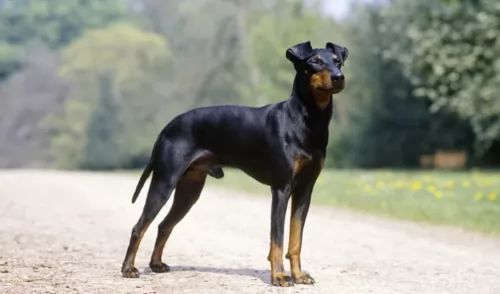 The Manchester Terrier has so many good qualities that make him such a good pet. Low maintenance, he is clean and well groomed to look at. He is also a healthy dog breed, nice and active and low maintenance.
The Manchester Terrier has so many good qualities that make him such a good pet. Low maintenance, he is clean and well groomed to look at. He is also a healthy dog breed, nice and active and low maintenance.
This little dog is willing to come into your home and heart. He will make you a wonderful pet and friend for as long as 15 years if you take special care of him.
 The Canadian Eskimo Dog is a generally healthy breed who has a life expectancy of between 10 and 15 years when he is lovingly cared for and provided with a top quality diet. Ensure that he has a top quality diet with plenty of raw meat geared towards his age and energy levels.
The Canadian Eskimo Dog is a generally healthy breed who has a life expectancy of between 10 and 15 years when he is lovingly cared for and provided with a top quality diet. Ensure that he has a top quality diet with plenty of raw meat geared towards his age and energy levels.
The Canadian Eskimo Dog suffers from common health issues that most dogs are at risk for, and typically this will include hip dysplasia and eye disease. If your dog develops a disease such as hip dysplasia, speak to your vet immediately.
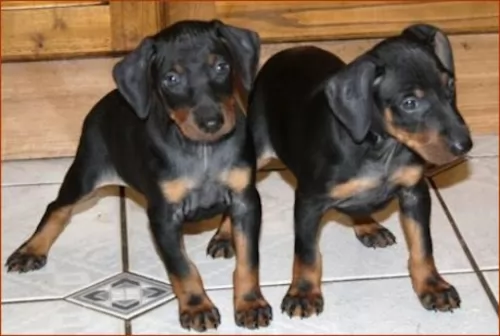 This dog breed is fairly healthy and can reach a good age if looked after well. Every dog though, can be affected by a number of inheritable genetic disorders.
This dog breed is fairly healthy and can reach a good age if looked after well. Every dog though, can be affected by a number of inheritable genetic disorders.
Glaucoma is a common genetic condition in Terrier breeds, including the Manchester Terrier. Secondary glaucoma, which is known as lens luxation is brought about when there is excessive pressure in the eyeball. The lens of the eye is put out of alignment. Most times surgery is the solution.
Von Willebrand's Disease is a blood disorder that affects the clotting process. A dog with this disease will have bleeding gums, continuous bleeding after surgery and sometimes blood in the stool. It’s a disease which can’t be cured but it can be managed with treatments.
 The Canadian Eskimo Dog has always been a working dog, used to being driven hard to perform, and to this day he likes to work hard and have his day filled with activities.
The Canadian Eskimo Dog has always been a working dog, used to being driven hard to perform, and to this day he likes to work hard and have his day filled with activities.
His exercise requirements are high and this is one breed that you’re going to have to exercise regularly – long walks, running on a leash as you cycle, ball games, swimming, hiking. It is why the dog is best suited for life in the country as opposed to small properties in the city. If exercise seems like a lot of hard work for you, don’t buy such a breed as it will be cruel and irresponsible to leave him day after day in your back yard. He becomes bored, frustrated, unhappy and destructive.
The dog is an average shedder and his coat is short and dense. There’s not a whole lot of maintenance to worry about with this good-looking dog and he will basically require having a good brush twice a week.
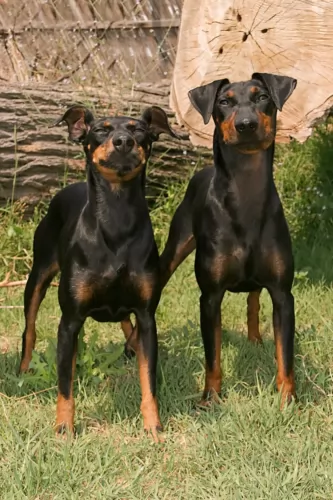 Low maintenance, the Manchester Terrier will only require a brushing once or twice a week. Check his eyes and ears for infections, clip his nails and brush his teeth 2 or 3 times a week.
Low maintenance, the Manchester Terrier will only require a brushing once or twice a week. Check his eyes and ears for infections, clip his nails and brush his teeth 2 or 3 times a week.
The Manchester Terrier is a lean, muscular dog and you want to be sure to keep him that way. If you feed him commercially manufactured food, make sure that it is one of the high quality brands – food which is packed full of vitamins and minerals to ensure the health of your dog.
Any packaged food you buy should be appropriate to the dog’s age and his activity levels. You won’t be doing your dog a favor by feeding him treats that you enjoy such as chocolate, coffee, peanuts, raisins, grapes and onions.
Dogs want simple food that don’t change much. Keeping things simple prevents upset stomachs. Give him some wholesome home-made food occasionally to add into his dry kibble. This can be boiled chicken, brown rice or pasta and some cooked or raw vegetables such as potatoes, carrots and spinach. Some raw meat added in from time to time can also do wonders for your dog. Make sure he has access around the clock to fresh, cool water.
The Manchester Terrier wants lots of exercise, and apart from him having his regular daily walks, he will need runs off the leash in the park. If you go cycling for instance, he will readily run beside you.